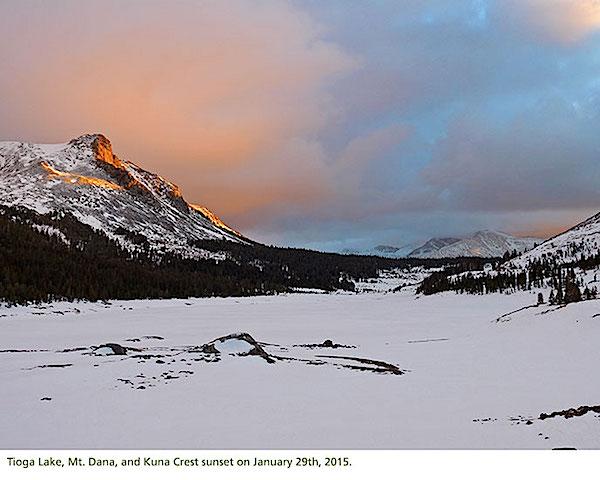
At Tuolumne Meadows, January was the warmest and driest January on record, according to weather measurements/NPS
Until a storm blew into California this weekend, winter weather had largely gone missing in Yosemite National Park, especially in Tuolumne Meadows. Rangers there reported that this January was the warmest and driest on record in Tuolume Meadows as measured at the weather station there.
That said, they noted, skiing on the Tioga Road and in the meadows was still pretty good.
"And, if you are feeling adventurous and creative, you can leave the security of the road and try your luck skiing on local summer hiking trails where, at least, there are fewer obstacles," Laura and Rob Pilewski reported on their blog on February 4. "Snowshoers are also using these corridors. We skied 17 miles yesterday while patrolling for the rare Sierra Nevada red fox. We only had to take our skis off once, and yes, we were feeling adventurous and creative (desperate is another appropriate adjective!)
"Just remember, it is Tuolumne Meadows without the cars; a wilderness paradise regardless of what mode of non-mechanized transportation one uses to get here."
According to their weather recordings, total settled snow depth was 5 inches as of February 4th, 2015 (at 8,600 feet); high temperature was 52°F, recorded on February 1, and the low temperature of 18°F was noted on February 3.



Comments
Actually, they are reporting there is a less than 50% probability that is the case
http://dailycaller.com/2015/01/19/hot-air-scientists-say-noaanasa-fudgin...
"Warmer" is relative in the winter. As long as it's still below 32 degrees F, that can sometimes mean more snow than much colder temps. Nope, I don't want to document that - just an observation from living in snowy climes :-) A quick Google search will show plenty of sources in that regard to snipe at. That's why a more accurate term is "climate change" rather than "global warming."
From the NYTimes....
The World Meteorological Organization reported on Monday that 2014 was the hottest year in a historical record of global temperature dating from 1880. That finding confirms an announcementmade last month by two American scientific agencies and one in Japan.
The Geneva-based agency noted, however, that 2014 was warmer than some other recent years by only a few hundredths of a degree, within the error margin of global temperature measurements. That effectively means that 2014, 2010 and 2005 are in a statistical tie.
A British group that tracks global temperatures recently cited the uncertainty in declining to name 2014 as the warmest year.
The World Meteorological Organization, the weather and climate arm of the United Nations, also pointed out that 14 of the 15 warmest years on record had all occurred in the 21st century, with 1998 being the only exception.
“The overall warming trend is more important than the ranking of an individual year,” the secretary general of the agency, Michel Jarraud, said in a statement.
http://www.nytimes.com/2015/02/03/science/earth/un-weather-agency-confir...
Yawwnnnnn - it's no longer interesting how predictable these comment threads have become on this site. How many times must the same group of repeat offenders repeat the same mantra over and over and over hoping that their mindless parroting by posting links to unsubstantiated blogs from the internet trashbin will sway unsuspected viewers that there is a "conflict" in the data? This is simply "phishing" for the bottom feeders...
Owen, I just don't find them creditable, not that it makes me right about the issue. That rag is very biased and has admitted so. Maybe you can find a more creditable source?
http://newsbusters.org/blogs/noel-sheppard/2013/08/18/new-york-times-pub...
Point is, the data in this article was collected from one region of the planet - within Yosemite NP. Do you have data that is different than what was collected there? If so, let's see it. If not, then quit posting trite blog posts leading to simply junky propaganda sites. Looking at today's global temperature anomaly data, most of the terrain on the Earth is above its historical mean average. Only portions in the Arctic down into Newfoundland are currently below normal. The rest of the planet (more than 2/3rds of it) have surface temps above normal. So to harp on Boston being the norm for the rest of the Earth is rather short-sighted and doesn't even begin to take on what is happening on the rest of the globe. Ignorance is bliss though, so carry on.
Most to the Earth isn't even measured and what is measured is being compared to manipulated historical data.
Climate whiplash. Curt Stager
http://www.paulsmiths.edu/faculty/stager
WATCH: https://www.youtube.com/watch?v=Ajt8nKhLdMY